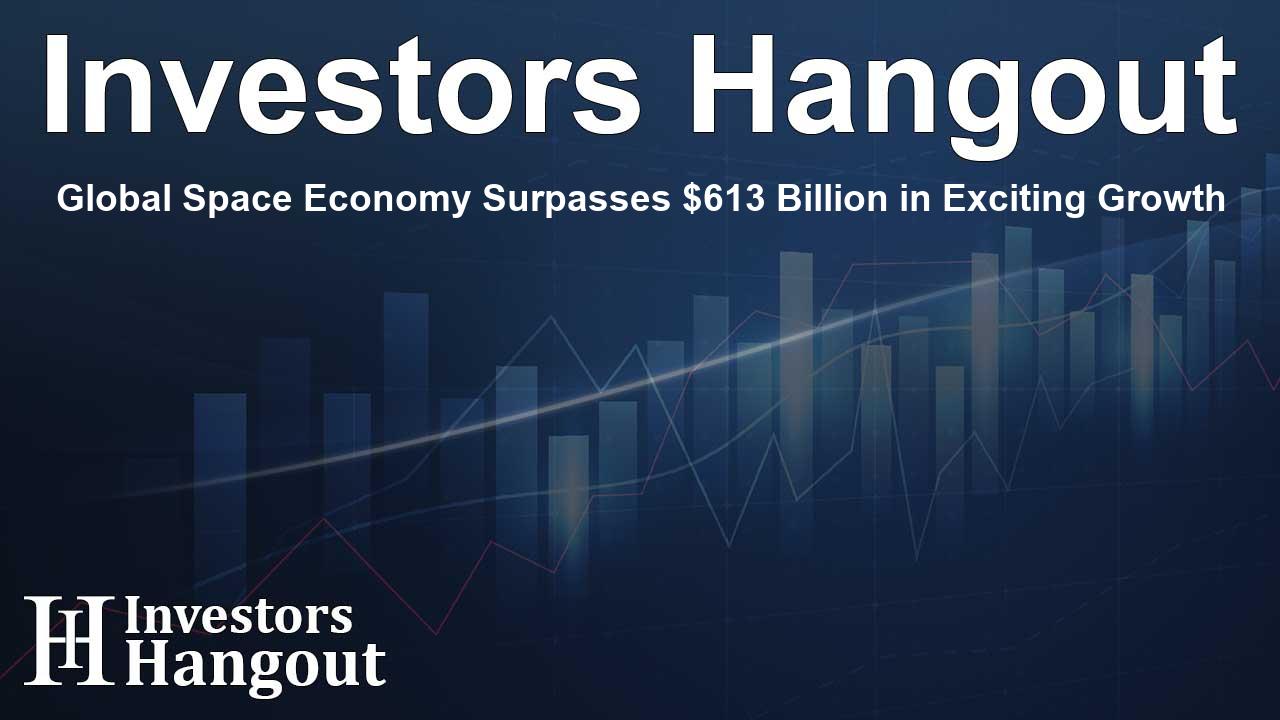Global Space Economy Surpasses $613 Billion in Exciting Growth

Space Economy Soars to New Heights
The latest report from the Space Foundation highlights an extraordinary milestone in the global space economy, achieving a remarkable $613 billion in 2024. This significant growth, marked at 7.8% year-over-year, underscores the increasingly integral role of space in stimulating economic development, ensuring national security, and improving public safety. With 78% of this growth attributed to the commercial sector, it's evident that private enterprises are leading the charge in innovation and expansion.
Commercial Sector Growth: A Key Driver
The Space Foundation's findings reveal that commercial ventures dominate the space market, making substantial contributions to the economy. This flourishing sector accounted for approximately $481 billion, while government investments accounted for the remaining 22%. In the realm of government funding, space budgets increased by 6.7%, totaling $132 billion, with a substantial portion dedicated to U.S. national security and civil initiatives.
Trends Influencing Economic Dynamics
According to Heather Pringle, CEO of Space Foundation, "Space is not just a frontier for exploration; it is a cornerstone of our economy and security." This sentiment was echoed at the Innovate Space: Global Economic Summit where essential data and trends influencing the space economy were shared. The conference featured a gathering of industry leaders and experts who examined both the commercial sector's influence and the dynamics of emerging markets.
Future Projections for the Space Sector
The forecast for the global space economy is optimistic, with projections suggesting that it could exceed $1 trillion by 2032. This growth will largely be fueled by the booming commercial market, particularly in communications and earth observation satellites. As technologies in these areas continue to advance, the potential for monetization appears promising.
Record Launch Activity
The first half of 2025 witnessed record-breaking activity in space launches, with an astonishing launch occurring every 28 hours from January 1 to June 30—setting a new benchmark for the industry. SpaceX led the charge with 81 launches, constituting more than half of the 149 total missions. Many of these launches were dedicated to deploying communications satellites, indicating robust growth in the satellite broadband sector. However, competition is intensifying with new constellations from major players like Amazon and Eutelsat.
The Role of Government Spending and Defense Initiatives
As nations continue to recognize the strategic importance of space, military funding for space initiatives is expected to see significant increases. In the United States, investment in programs such as the proposed Golden Dome missile defense system has been prioritized, with initial investments of $25 billion approved to enhance military space capabilities. This focus on strategic military applications of space stands to further accelerate growth within the sector.
International Developments in Space
Globally, many countries are ramping up their efforts to establish independent military space capabilities in response to regional tensions. European and Asian nations are particularly active, initiating domestic programs to bolster their military space initiatives, fostering a global climate of competition and advancement in military satellite technology.
Conclusion
The findings from the Space Foundation’s report indicate that the space economy is not only growing at an impressive rate but is also becoming increasingly vital to various aspects of society today. With significant advancements occurring across commercial sectors, defense initiatives, and technological improvements, the future of the global space economy looks brighter than ever. As we move towards 2032 and beyond, the convergence of these factors has the potential to elevate the global space industry to unprecedented heights.
Frequently Asked Questions
What is the current size of the global space economy?
The global space economy reached $613 billion in 2024, showing a growth rate of 7.8% from the previous year.
What portion of the space economy is attributed to the commercial sector?
The commercial sector accounts for 78% of the global space economy, indicating its vital role in driving growth.
Who is the CEO of Space Foundation?
Heather Pringle serves as the CEO of the Space Foundation, emphasizing the importance of space in our economy and security.
What are future projections for the global space economy?
Projections suggest that the global space economy could exceed $1 trillion by 2032, fueled by the commercial sector and advancements in technology.
How is military spending influencing the space sector?
Military investments, particularly in the U.S., are set to increase, with initiatives like the Golden Dome missile shield projected to enhance military space capabilities significantly.
About The Author
Contact Dylan Bailey privately here. Or send an email with ATTN: Dylan Bailey as the subject to contact@investorshangout.com.
About Investors Hangout
Investors Hangout is a leading online stock forum for financial discussion and learning, offering a wide range of free tools and resources. It draws in traders of all levels, who exchange market knowledge, investigate trading tactics, and keep an eye on industry developments in real time. Featuring financial articles, stock message boards, quotes, charts, company profiles, and live news updates. Through cooperative learning and a wealth of informational resources, it helps users from novices creating their first portfolios to experts honing their techniques. Join Investors Hangout today: https://investorshangout.com/
The content of this article is based on factual, publicly available information and does not represent legal, financial, or investment advice. Investors Hangout does not offer financial advice, and the author is not a licensed financial advisor. Consult a qualified advisor before making any financial or investment decisions based on this article. This article should not be considered advice to purchase, sell, or hold any securities or other investments. If any of the material provided here is inaccurate, please contact us for corrections.
